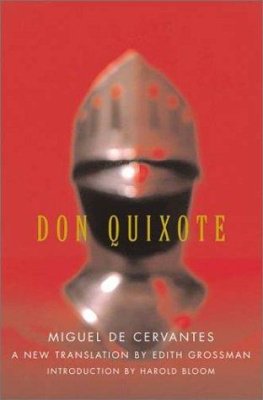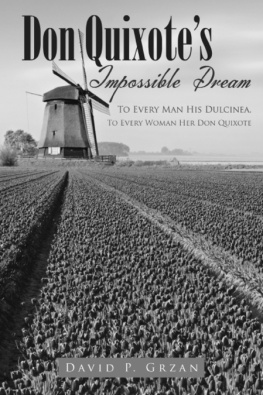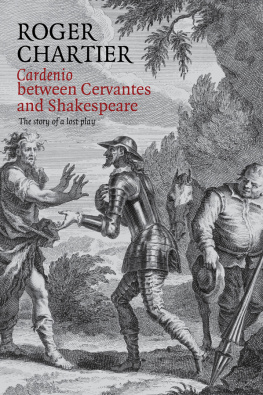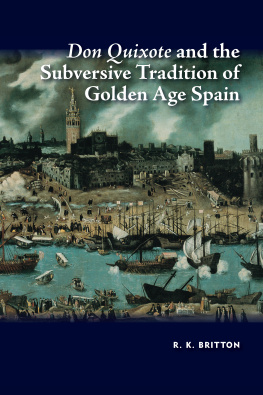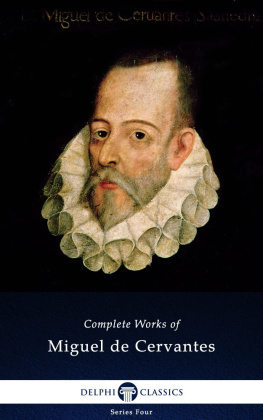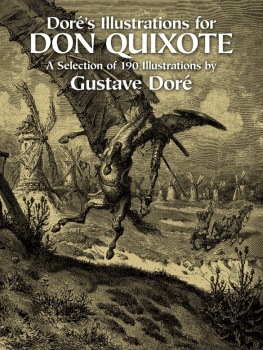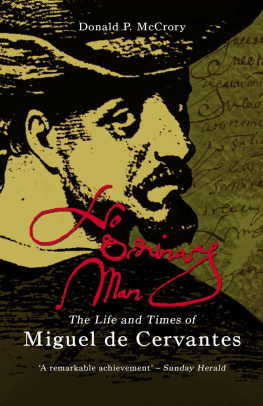Miguel de Cervantes - Don Quixote (translated with an Introduction by John Ormsby)
Here you can read online Miguel de Cervantes - Don Quixote (translated with an Introduction by John Ormsby) full text of the book (entire story) in english for free. Download pdf and epub, get meaning, cover and reviews about this ebook. year: 2015, publisher: Digireads.com, genre: Detective and thriller. Description of the work, (preface) as well as reviews are available. Best literature library LitArk.com created for fans of good reading and offers a wide selection of genres:
Romance novel
Science fiction
Adventure
Detective
Science
History
Home and family
Prose
Art
Politics
Computer
Non-fiction
Religion
Business
Children
Humor
Choose a favorite category and find really read worthwhile books. Enjoy immersion in the world of imagination, feel the emotions of the characters or learn something new for yourself, make an fascinating discovery.

- Book:Don Quixote (translated with an Introduction by John Ormsby)
- Author:
- Publisher:Digireads.com
- Genre:
- Year:2015
- Rating:4 / 5
- Favourites:Add to favourites
- Your mark:
- 80
- 1
- 2
- 3
- 4
- 5
Don Quixote (translated with an Introduction by John Ormsby): summary, description and annotation
We offer to read an annotation, description, summary or preface (depends on what the author of the book "Don Quixote (translated with an Introduction by John Ormsby)" wrote himself). If you haven't found the necessary information about the book — write in the comments, we will try to find it.
Don Quixote (translated with an Introduction by John Ormsby) — read online for free the complete book (whole text) full work
Below is the text of the book, divided by pages. System saving the place of the last page read, allows you to conveniently read the book "Don Quixote (translated with an Introduction by John Ormsby)" online for free, without having to search again every time where you left off. Put a bookmark, and you can go to the page where you finished reading at any time.
Font size:
Interval:
Bookmark:
DON QUIXOTE
By MIGUEL DE CERVANTES
Translated with a Preface by
JOHN ORMSBY
Don Quixote
By Miguel de Cervantes
Translated with a Preface by John Ormsby
Print ISBN 13: 978-1-4209-5132-5
eBook ISBN 13: 978-1-4209-5133-2
This edition copyright 2015. Digireads.com Publishing.
All rights reserved. No part of this publication may be reproduced, distributed, or transmitted in any form or by any means, including photocopying, recording, or other electronic or mechanical methods, without the prior written permission of the publisher, except in the case of brief quotations embodied in critical reviews and certain other noncommercial uses permitted by copyright law.
Cover Image: A detail of And running his lance into the sail, illustration from The Adventures of Don Quixote , published by G. Bell & Sons, Ltd., 1911 (colour litho), Hardy, Paul (fl.1890-99) / Private Collection / Bridgeman Images.
Please visit www.digireads.com
CONTENTS
I. ABOUT THIS TRANSLATION
It was with considerable reluctance that I abandoned in favour of the present undertaking what had long been a favourite project: that of a new edition of Sheltons Don Quixote, which has now become a somewhat scarce book. There are someand I confess myself to be onefor whom Sheltons racy old version, with all its defects, has a charm that no modern translation, however skilful or correct, could possess. Shelton had the inestimable advantage of belonging to the same generation as Cervantes; Don Quixote had to him a vitality that only a contemporary could feel; it cost him no dramatic effort to see things as Cervantes saw them; there is no anachronism in his language; he put the Spanish of Cervantes into the English of Shakespeare. Shakespeare himself most likely knew the book; he may have carried it home with him in his saddle-bags to Stratford on one of his last journeys, and under the mulberry tree at New Place joined hands with a kindred genius in its pages.
But it was soon made plain to me that to hope for even a moderate popularity for Shelton was vain. His fine old crusted English would, no doubt, be relished by a minority, but it would be only by a minority. His warmest admirers must admit that he is not a satisfactory representative of Cervantes. His translation of the First Part was very hastily made and was never revised by him. It has all the freshness and vigour, but also a full measure of the faults, of a hasty production. It is often very literalbarbarously literal frequentlybut just as often very loose. He had evidently a good colloquial knowledge of Spanish, but apparently not much more. It never seems to occur to him that the same translation of a word will not suit in every case. With him discretea chameleon of a word in its way of taking various meanings according to circumstancesis always discreet, admirar is always admire, sucesos always successes (which it seldom means), honesto always honest (which it never means), suspense always suspended; desmayarse, to swoon or faint, is always to dismay (one lady is a mutable and dismayed traitress, when fickle and fainting is meant, and another made shew of dismaying when she seemed ready to faint); trance, a crisis or emergency, is always simply trance; disparates always fopperies, which, however, if not a translation, is an illustration of the meaning, for it is indeed nonsense. These are merely a few samples taken at haphazard, but they will suffice to show how Shelton translated, and why his Don Quixote, veritable treasure as it is to the Cervantist and to the lover of old books and old English, cannot be accepted as an adequate translation.
It is often said that we have no satisfactory translation of Don Quixote. To those who are familiar with the original, it savours of truism or platitude to say so, for in truth there can be no thoroughly satisfactory translation of Don Quixote into English or any other language. It is not that the Spanish idioms are so utterly unmanageable, or that the untranslatable words, numerous enough no doubt, are so superabundant, but rather that the sententious terseness to which the humour of the book owes its flavour is peculiar to Spanish, and can at best be only distantly imitated in any other tongue. The dilemma of the translator frequently is this, that terseness is essential to the humour of the phrase or passage, but if he translates he will not be terse, and if he would be terse he must paraphrase.
The history of our English translations of Don Quixote is instructive. Sheltons, the first in any language, was made, apparently, about 1608, but not published till 1612. This of course was only the First Part. It has been asserted that the Second, published in 1620, is not the work of Shelton, but there is nothing to support the assertion save the fact that it has less spirit, less of what we generally understand by go, about it than the first, which would be only natural if the first were the work of a young man writing currente calamo , and the second that of a middle-aged man writing for a bookseller. On the other hand, it is closer and more literal, the style is the same, the very same translations, or mistranslations, occur in it, and it is extremely unlikely that a new translator would, by suppressing his name, have allowed Shelton to carry off the credit.
In 1687 John Phillips, Miltons nephew, produced a Don Quixote made English, he says, according to the humour of our modern language. The origin of this attempt is plain enough. In 1656 that indecorous Oxford Don, Edmond Gayton, had produced his Festivous Notes on Don Quixote, a string of jests, more or less dirty, on the incidents in the story, which seems to have been much relished; and in 1667 Sir Roger lEstrange had published his version of Quevedos Visions from the French of La Geneste, a book which the lively though decidedly coarse humour, cockney jokes and London slang, wherewith he liberally seasoned it, made a prodigious favourite with the Restoration public. It struck Phillips that, as Shelton was now rather antiquated, a Don Quixote treated in the same way might prove equally successful. He imitated LEstrange as well as he could, but LEstrange was a clever penman and a humourist after his fashion, while Phillips was only a dull buffoon. His Quixote is not so much a translation as a travesty, and a travesty that for coarseness, vulgarity, and buffoonery is almost unexampled even in the literature of that day.
Ned Wards Life and Notable Adventures of Don Quixote, merrily translated into Hudibrastic Verse (1700), can scarcely be reckoned a translation, but it serves to show the light in which Don Quixote was regarded at the time.
A further illustration may be found in the version published in 1712 by Peter Motteux, who had then recently combined tea-dealing with literature. It is described as translated from the original by several hands, but if so all Spanish flavour has entirely evaporated under the manipulation of the several hands. The flavour that it has, on the other hand, is distinctly Franco-cockney. Anyone who compares it carefully with the original will have little doubt that it is a concoction from Shelton and the French of Filleau de Saint Martin, eked out by borrowings from Phillips, whose mode of treatment it adopts. It is, to be sure, more decent and decorous, but it treats Don Quixote in the same fashion as a comic book that cannot be made too comic.
To attempt to improve the humour of Don Quixote by an infusion of cockney flippancy and facetiousness, as Motteuxs operators did, is not merely an impertinence like larding a sirloin of prize beef, but an absolute falsification of the spirit of the book, and it is a proof of the uncritical way in which Don Quixote is generally read that this worse than worthless translationworthless as failing to represent, worse than worthless as misrepresentingshould have been favoured as it has been. That it should have been popular in its own day, or that a critic who understood the original so little as Alexander Fraser Tytler should think it by far the best, is no great wonder. But that so admirable a scholar as Ticknor should have given it even the lukewarm approval he bestows upon it, and that it should have been selected for reproduction in luxurious shapes three or four times within these last three or four years, is somewhat surprising. Ford, whose keen sense of humour, and intimate knowledge of Spain and the Spanish character, make him a more trustworthy critic on this particular question than even the illustrious American, calls it of all English translations the very worst. This is of course too strong, for it is not and could not be worse than Phillipss, but the vast majority of those who can relish Don Quixote in the original will confirm the judgment substantially.
Next pageFont size:
Interval:
Bookmark:
Similar books «Don Quixote (translated with an Introduction by John Ormsby)»
Look at similar books to Don Quixote (translated with an Introduction by John Ormsby). We have selected literature similar in name and meaning in the hope of providing readers with more options to find new, interesting, not yet read works.
Discussion, reviews of the book Don Quixote (translated with an Introduction by John Ormsby) and just readers' own opinions. Leave your comments, write what you think about the work, its meaning or the main characters. Specify what exactly you liked and what you didn't like, and why you think so.

